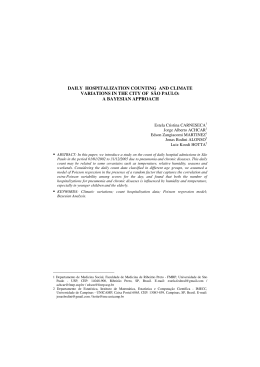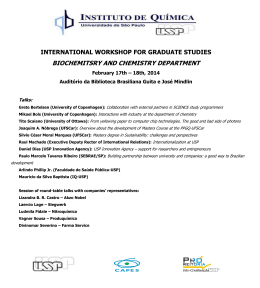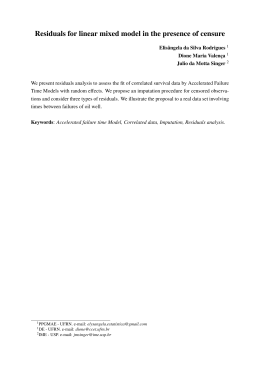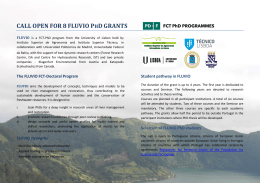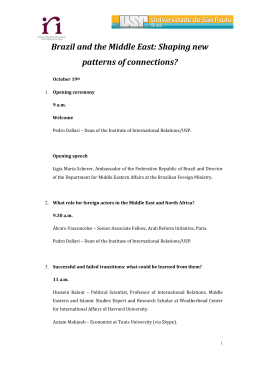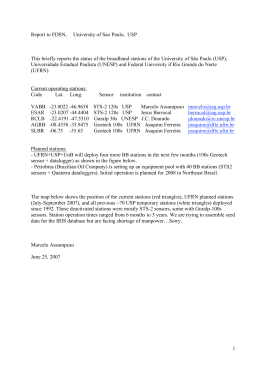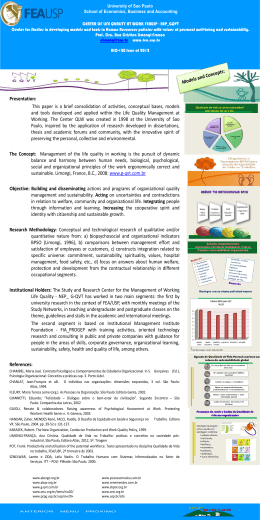Graduate courses on Animal Behavior in Brazil Data compiled by Prof. Eduardo Bessa (Universidade do Estado de Mato Grosso-UNEMAT) This is an incomplete list! If you have information on other graduate, master or PhD programs teaching animal behavior you wish to include into this list, please contact: Wilfried Klein ([email protected]) – Secretary of the SBEt UnB (Federal University of Brasília) The Laboratory of Animal Behavior (http://www.comportamento-animal.unb.br/) is linked to the Department of Zoology of the University of Brasilia. The Laboratory is typically composed of approximately 8 or 9 graduate students and a half dozen undergraduates. Most of the research developed in our lab focuses on sexual selection (including parent-offspring interactions, acoustic communication and signalling behavior in general) and the evolution of cooperative breeding systems. Most of our work is with birds, but we have also developed projects with primates and insects. Graduate students enter the Laboratory through the Graduate Program in Ecology, for which there is an entrance examination. Approved students have graduate stipends to cover living costs and because the University of Brasilia is a federal institution, there are no tuition costs Projects (Master’s and PhD) developed in the Laboratory of Animal Behavior are both fieldand lab-based. For our field work we have access to a 4,500 ha university property composed of several native vegetation habitats and cultivated areas. For laboratory experiments we keep a captive group of approximately 130 birds (Volatinia jacarina) in the campus of the university in an outside aviary. The typical calendar for registration for Entrance Examinations to the Graduate Program in Ecology opens in October of each year. Usually, exams occur in mid-November, and results are announced by the end of November. Student registration is usually in January and classes start in March. Contact: Regina Macedo - [email protected]. UFBA (Federal University of Bahia) The graduate program in Animal diversity aims to form professional who domain conceptual tools and techniques relevant to solving zoological problems. The curricular structure privileges a comparative and evolutionary approach. One of the three research streams serves specifically natural history and animal behaviour. Through it it is intended to support an evolutionary view of animal behaviour, integrating it to ecological questions related to diversity conservation. Master’s Program: http://www.diversidadeanimal.bio.ufba.br/ Experimental research bioterium, Natural History Museum with equipment for digital analysis of ethograms. Selection: Every year in November or December. Contact: Hilton Japyassú - Tel.: (55) 71 3283 6519 UFRN (Federal University of Rio Grande do Norte) The postgraduate study program on Psychobiology of Federal University of Rio Grande do Norte houses a vibrant and active community, formed by 18 professors (14 permanent and 4 collaborating), 82 students (47 in their master´s and 35 PhD students) plus many scientific initiation students in two focal areas: Behavioural studies and Physiologic Psychology. The program has entitled over 150 masters and PhD’s. The alumni of this program are teachers in k12, high school and universities, researchers in public and private institutes. The program is recognized by CAPES and has received for the third time grade 5. The program in Psychobiology of UFRN aims to permit biologists, psychologists and professionals from correlated areas to teach and research, with emphasis in the study of behaviour and its biological basis within a multidisciplinary perspective. Master’s and PhD program: www.cb.ufrn.br/~fisiologia/novo/posGraduacao/ Studies in behaviour and physiological psychology Selection: Every year in November or December for master’s degree and continuous flux for PhD. [email protected] Contact: Diana Lunardi Unicamp (State University of Campinas) The program has a special emphasis in evolutionary ecology, including diverse related themes like biodiversity and phylogeny, interaction ecology and behavioural ecology. The model organisms include a wide range of taxa, including terrestrial and aquatic vertebrates and invertebrates, as well as plants. Master’s and PhD program: Most of the researches are accomplished in the field. Nevertheless, UNICAMP offers good conditions for captive observations of invertebrates. Submissions occur in September, For the PhD there is an extra call on July. [email protected] Contact: Paulo Sérgio Oliveira UFU (Federal University of Uberlândia) Ecology and conservation of natural resources, master’s degree and PhD graded 5by CAPES tending to 6. 2010 evaluation. Thesis and dissertations in all areas of ecology, 30 to 40% are totally focused in behavioural ecology. Master’s and PhD program: www.ib.ufu.br/posgrad Laboratory, field ecological station, annual field course, specific disciplines in the area, arrangements with University of Missoury and University of Vienna. [email protected] Contact: Kleber Del-Claro USP (University of São Paulo) Master’s and PhD programs: Biologia Comparada, Entomologia, Psicobiologia, Psicologia (FFCLRP – USP) Contact: http://www.ffclrp.usp.br/posgraduacoes/posgraduacao_programas.php Neurociências e Comportamento (IP – USP) Contact: www.ip.usp.br/posg/nec/ UNIFESP (FEDERAL UNIVERSITY OF SÃO PAULO) Master’s programs: Ecologia e Evolução (Universidade Federal de São Paulo) Contact: http://www.unifesp.br/home_diadema/posgrad/ecoevo/ Contact: Rodrigo Hirata Willemart ([email protected])
Download
